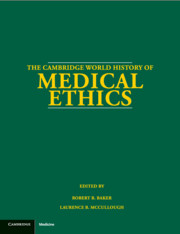Book contents
- Frontmatter
- PART I AN INTRODUCTION TO THE HISTORY OF MEDICAL ETHICS
- PART II A CHRONOLOGY OF MEDICAL ETHICS
- PART III DISCOURSES OF MEDICAL ETHICS THROUGH THE LIFE CYCLE
- PART IV THE DISCOURSES OF RELIGION ON MEDICAL ETHICS
- PART V THE DISCOURSES OF PHILOSOPHY ON MEDICAL ETHICS
- PART VI THE DISCOURSES OF PRACTITIONERS ON MEDICAL ETHICS
- PART VII THE DISCOURSES OF BIOETHICS
- 38 The Discourses of Bioethics in the United States
- 39 The Discourses of Bioethics in the United Kingdom
- 40 The Discourses of Bioethics in Western Europe
- 41 The Discourses of Bioethics in Post-Communist Eastern Europe
- 42 The Discourses of Bioethics in Latin America
- 43 The Discourses of Bioethics in East Asia
- 44 The Discourses of Bioethics in South Asia
- 45 The Discourses of Bioethics in Sub-Saharan Africa
- PART VIII DISCOURSES ON MEDICAL ETHICS AND SOCIETY
- Appendix: Biographies: Who Was Who in the History of Medical Ethics
- Bibliography
- Index
44 - The Discourses of Bioethics in South Asia
from PART VII - THE DISCOURSES OF BIOETHICS
Published online by Cambridge University Press: 28 May 2012
- Frontmatter
- PART I AN INTRODUCTION TO THE HISTORY OF MEDICAL ETHICS
- PART II A CHRONOLOGY OF MEDICAL ETHICS
- PART III DISCOURSES OF MEDICAL ETHICS THROUGH THE LIFE CYCLE
- PART IV THE DISCOURSES OF RELIGION ON MEDICAL ETHICS
- PART V THE DISCOURSES OF PHILOSOPHY ON MEDICAL ETHICS
- PART VI THE DISCOURSES OF PRACTITIONERS ON MEDICAL ETHICS
- PART VII THE DISCOURSES OF BIOETHICS
- 38 The Discourses of Bioethics in the United States
- 39 The Discourses of Bioethics in the United Kingdom
- 40 The Discourses of Bioethics in Western Europe
- 41 The Discourses of Bioethics in Post-Communist Eastern Europe
- 42 The Discourses of Bioethics in Latin America
- 43 The Discourses of Bioethics in East Asia
- 44 The Discourses of Bioethics in South Asia
- 45 The Discourses of Bioethics in Sub-Saharan Africa
- PART VIII DISCOURSES ON MEDICAL ETHICS AND SOCIETY
- Appendix: Biographies: Who Was Who in the History of Medical Ethics
- Bibliography
- Index
Summary
INTRODUCTION
The region of South Asian includes India, Nepal, Sri Lanka, Pakistan, and Bangladesh. This chapter will focus on India and Sri Lanka to provide examples of the transition from traditional Hindu and Buddhist medical ethics, which once dominated the region to contemporary bioethics. Many of the topics of modern South Asian bioethics are foreshadowed in traditional medical ethics. These include an understanding of well-being that integrates body, mind, and environment (although the modern version focuses not just on the patient but also on patient's rights). Whereas autonomy had its precedent in concepts such as the law of karma, it was generally muted because of the group orientation of traditional South Asian societies; in the modern period, autonomy increases and with it choice and informed consent. The same might be said for privacy and confidentiality; we find precedents but they become emphasized in the modern period. Whereas regulation of physicians was a concern in the past, it has become even more so today. Because hierarchy prevailed in premodern societies, access and justice become important topics for modern bioethics.
Consciousness-raising about the importance of bioethics has occurred in part through international collaborations and forums concerned with improving health care and ethics in developing countries. The European Union has helped a hospital in Chennai, India, develop its ethics policies and several medical schools in Norway have helped establish ethics programs in Sri Lankan medical schools.
- Type
- Chapter
- Information
- The Cambridge World History of Medical Ethics , pp. 509 - 524Publisher: Cambridge University PressPrint publication year: 2008



